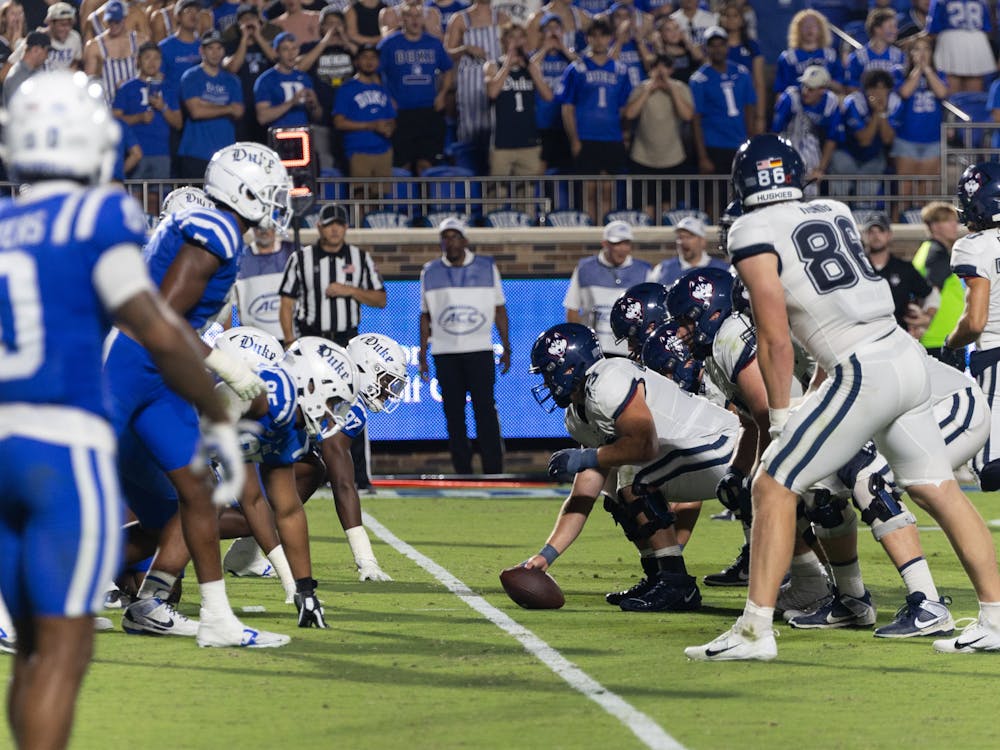For two nights in a row, Brooks Field will look as “perfect” as Ed Sheeran’s No. 1 single.
At least, that’s the plan. With less than 24 hours between the concert and football game against North Carolina, Duke’s groundskeeping and athletic operations teams face a remarkable challenge: preserving a playing surface and fan experience across two blockbuster events.
“Our number one priority is to make sure that when our team hits the field on Saturday, they do not have any idea [that] something other than a football game has taken place,” wrote Ian Christie, Duke’s senior superintendent for landscape services, in an email to The Chronicle.
That means Sheeran won’t perform from Wallace Wade’s playing surface itself. He and other artists will instead entertain concert-goers atop the strip of synthetic turf lining the home sideline of the stadium. Unlike the live grass that makes up the field, this area won’t die when covered with a stage.
“Everything is built out and designed to maximize or minimize impact to the actual planting surface,” said Bob Weiseman, Duke’s deputy director of athletics/operations and capital projects.
But though the location choice minimizes potential damages, hosting the concert still places a heavy workload on Duke’s groundskeepers and athletic operations teams. Under the light of a thousand stars, they’ll need to quickly transform the pop arena back into a stadium fit for a rivalry football game.
First, they’ll break down the stage — a logistical nightmare, given that it involves driving a multi-thousand-pound tractor trailer across Brooks Field’s delicate bermudagrass. Protecting the playing surface requires laying down a three-quarter-inch layer of plywood by hand, then topping it with a material called SignaRoad that allows forklifts and trucks to traverse the field.
Limiting the duration of this ground coverage proves key: If it’s left in place for too long, the grass won’t survive. During stage set-up, the materials were limited to five hours on the field. A three-hour timeline is projected for removal early Saturday morning.
But even once the stage is gone, Duke’s groundskeepers will have a long to-do list: replacing benches, mowing and re-painting the field as necessary. The kicker?
“All of this needs to be done before about 9 a.m. ... for the football teams to have access to set up their equipment,” Christie wrote.
And though time is of the essence, it’s not the only concern.
“We add weather to this week, and it greatly adds stress for both events,” Christie wrote, alluding to the week's previous storms and Friday’s uncertain precipitation forecasts.
Though athletic operations teams plan to monitor Tropical Storm Helene as it rolls in, the tight schedule means only high winds or electrical activity could prompt a change of plans.
“Timing is important,” Weiseman said. “We couldn't do any type of long delay or pushback and still be ready for the football game.”
The groundskeeping team has overcome challenges before. Last year, they dealt with a field storming, sporadic storms and three home games within 13 days. Their excellence and innovation in the face of these obstacles won Duke its first SFMA College and University Football Field of the Year Award.
That being said, the demands of Duke's Centennial Founders’ Day and Homecoming Weekend celebrations surpass anything the field team has experienced. By Weiseman’s estimations, between 100 and 150 staff members will be involved in the overnight tear-down of the concert and rebuilding of the football field.
“This is completely new,” Christie writes. “I personally like the challenge … Many things can be accomplished when you put together a great team and invest in greatness.”
Brooks Field rests in capable hands this weekend. But while Ed Sheeran fans can sing about dancing “barefoot in the grass” in Wallace Wade, they’ll have to live out the lyrics some other time.
Get The Chronicle straight to your inbox
Sign up for our weekly newsletter. Cancel at any time.

Abby DiSalvo is a Trinity sophomore and assistant Blue Zone editor of The Chronicle's 120th volume.

